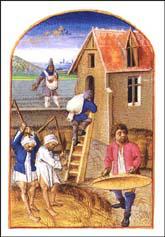Origins of Parliament
Kings in the Middle Ages would often consult their barons before making important decisions. The barons were usually called upon to appear before the king during religious festivals (Christmas, Easter, Witsun). Some of the barons were given specific jobs to perform for the king, for example, one would be asked to be treasurer.
Some kings chose to ignore the advice of their barons. When this led to bad things happening, the barons became angry. This is one of the reasons why the barons rebelled against King John and made him sign the Magna Carta.
Henry III, like his father, tended to ignore the advice of his barons. In 1264, the barons, under the leadership of Simon de Montfort, took up arms against their king. One of those barons who joined the rebellion was the nineteen-year-old, Gilbert de Clare, 8th Earl of Gloucester. Gilbert, who had bright red hair, became known as the Red Earl.
Simon de Montfort and his rebel army attacked Rochester Castle on 18 April, 1264. When Henry heard news of the attack he ordered his army to march on Tonbridge Castle. As Gilbert de Clare and his soldiers were away at Rochester the king had little difficulty capturing Tonbridge. After taking Gilbert's wife, Alice, prisoner, Henry set fire to both the castle and the town.
Henry's army now moved on to Lewes where he was met by Simon de Montfort, the Red Earl and the rest of the rebel barons. The king was defeated and Simon de Montfort took control of parliament (parler was Norman French for talk). The following year Simon de Montfort expanded parliament by inviting representatives from the shires and towns to attend the meetings.
Gilbert de Clare supported these parliamentary reforms but was unhappy when he heard that Montfort planned to form an alliance with the Welsh prince, Llewellyn ap Gruffudd. Gilbert had been in conflict with Llewellyn over lands that he owned in Glamorgan. Gilbert began having talks with King Henry and the two eventually agreed to join forces against Montfort. At the Battle of Evesham, the royalist army defeated Simon de Montfort's forces.
In return for this help, King Henry supported the Gilbert in his struggles with Prince Llewellyn. Gilbert was victorious and to protect his land in Wales built Caerphilly Castle. When it was completed, Caerphilly Castle was considered to be the most impressive fortress in Britain.
When Henry III died, his son Edward became king. Edward I was concerned with the amount of power the Red Earl possessed and decided that he had to find a way of guaranteeing his loyalty. In 1283, the king ordered the Red Earl to divorce his wife, disinherit his children, and marry his 11 year old daughter, Joan of Acre. In 1291 Joan gave birth to a son, Gilbert, who became the legal heir to the Clare estates.
Edward, like his father, was constantly short of money. When he called a meeting of parliament he followed Simon de Montfort's example and invited representatives from every shire and town in England. Towns often had difficulty in raising the money needed to send their representatives to the meeting. Some towns ignored the king's request and refused to send delegates to parliament. However, even when they were not represented, they still had to pay the taxes that were agreed at the meeting.
When the representatives arrived they usually met in five different groups: (1) the prelates (bishops and abbots); (2) the magnates (earls and barons); (3) the clergy; (4) the knights from the shires; (5) the citizens from the towns. As soon as agreement was reached about taxes, groups 3, 4 and 5 (the commons) were sent home. With the commons absent, the king would then discuss important issues such as new laws with his bishops, abbots, earls and barons (the lords).

Primary Sources
(1) The Song of Lewes (1264)
May the Lord bless Simon de Montfort and also his army who, exposing themselves to death, fought bravely for the English people... Simon de Montfort had few men used to fighting; the royal party was large, having assembled the greatest warriors in England... but God provided... since God is a help to those who are on the side of justice.
(2) Matthew Paris, English History (c. 1275)
Earl Simon de Montfort,-who gave up not only his property, but also his life, to defend the poor from oppression, and for the maintenance of justice.
